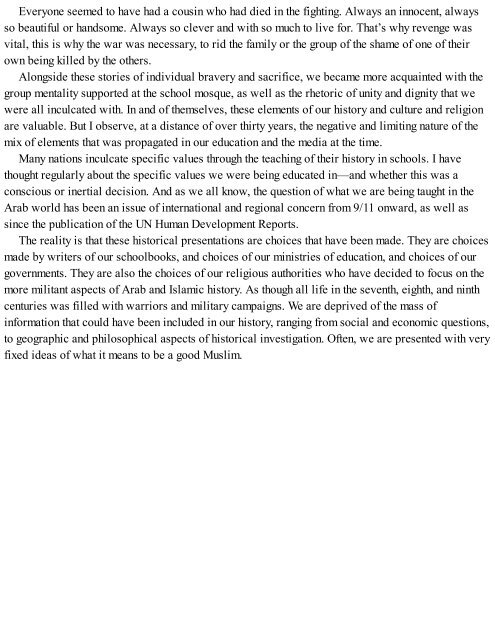1250119847
Create successful ePaper yourself
Turn your PDF publications into a flip-book with our unique Google optimized e-Paper software.
Everyone seemed to have had a cousin who had died in the fighting. Always an innocent, always<br />
so beautiful or handsome. Always so clever and with so much to live for. That’s why revenge was<br />
vital, this is why the war was necessary, to rid the family or the group of the shame of one of their<br />
own being killed by the others.<br />
Alongside these stories of individual bravery and sacrifice, we became more acquainted with the<br />
group mentality supported at the school mosque, as well as the rhetoric of unity and dignity that we<br />
were all inculcated with. In and of themselves, these elements of our history and culture and religion<br />
are valuable. But I observe, at a distance of over thirty years, the negative and limiting nature of the<br />
mix of elements that was propagated in our education and the media at the time.<br />
Many nations inculcate specific values through the teaching of their history in schools. I have<br />
thought regularly about the specific values we were being educated in—and whether this was a<br />
conscious or inertial decision. And as we all know, the question of what we are being taught in the<br />
Arab world has been an issue of international and regional concern from 9/11 onward, as well as<br />
since the publication of the UN Human Development Reports.<br />
The reality is that these historical presentations are choices that have been made. They are choices<br />
made by writers of our schoolbooks, and choices of our ministries of education, and choices of our<br />
governments. They are also the choices of our religious authorities who have decided to focus on the<br />
more militant aspects of Arab and Islamic history. As though all life in the seventh, eighth, and ninth<br />
centuries was filled with warriors and military campaigns. We are deprived of the mass of<br />
information that could have been included in our history, ranging from social and economic questions,<br />
to geographic and philosophical aspects of historical investigation. Often, we are presented with very<br />
fixed ideas of what it means to be a good Muslim.
















